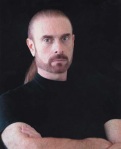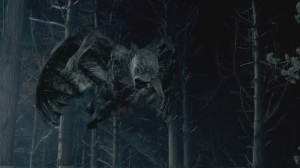I finished this book a couple weeks ago, but haven’t had the time to give my thoughts on it. Until now, so I can finally check it off my Day Planner.
The plot was good. I’ll try not to be too critical of this one.
The Story
The book picks up right where it left off from the first one, and honestly, this story feels like the second half of Wizard’s First Rule. Richard parts ways with his mentor Zedd for the purposes of marrying Kahlan. He leaves so quickly that he misses a lot of action that could have prevented a lot of confusion in Richard’s side of the story. A sect called the Sisters of Light (and Dark) are introduced, and once again, because of prophecies, the Sisters of Light decide to take Richard under their wing for their own purposes. They seek him out and he goes off alone with Sister Verna on the day of his wedding — but not after Kahlan purposefully misleads Richard into thinking that he must degrade himself again by wearing the scholastic collar.
So he leaves, thinking she doesn’t love him anymore, and then the story takes us back to Kahlan’s journey of discovering some vindictive Imperial Army who have been wreaking havoc in the Midlands. She fights against them, then eventually she is captured by the Midland’s government and is sentenced to death. Of course, she is only a scapegoat and is wrongfully accused, but tell that to the sheep who want her head.
Meanwhile, Richard takes his trek with Sister Verna to Aydindril. He fights with her the whole time, vowing he’ll kill them all if they anger him (Rich, get over it already!). Along the way, he befriends a gar, Gratch, and when they arrive at Aydindril, Sister Verna is demoted for his bad behavior. He immediately starts causing trouble and sneaking around, then figures out his powers and purposes, that he is really still a puppet at this point in time, and he exposes the Sisters of Darkness by the end of his stay there. He makes two friends there (why is it that I like his friends better than the MC’s Richard and Kahlan?) and despite their using him, he saves Aydindril and finally repairs the veil and closes the boxes of Orden. However, he and Kahlan are not reunited by the last paragraph (at least not in reality as we know it) and that separation is a decent enough cliffhanger for me.
My Thoughts
This second book is a whopping 880 pages, and unnecessarily so. Goodkind gets a bit repetitive and goes as far as the middle of the book to rehash what the first book was about. If one hasn’t bothered to read the first of a series, why in the world are they starting from the second book? I feel that it is the reader’s loss if they’re confused, and that the author is under no obligation to have to reiterate and summarize to the reader. Maybe it’s a publisher’s requirement, I don’t know. But Goodkind didn’t have to write pages upon pages of summary.
This brings me to my main peeve about Stone of Tears: while Goodkind is a good writer, he is lacking a good editor. The setup was good enough, but his middle dragged and there are numerous areas that should have been condensed. The end was great, and connecting the dots and watching everything unravel was enjoyable. But the length at certain points stick out and taints it as a whole. And honestly, I trudged through every page preceding p800, but after p800, I began to lose track of time as I (finally) got caught into the story. But then there were only 80 pages of exciting story to read through.
Pros:
I enjoyed some new characters, especially Warren and Sister Verna. The climax was better than WFR, and overall, the progression of the characters and events was realistic enough, despite the superfluity of prophecies.
Cons:
The foreshadowing becomes painfully obvious at times. It took too long for Richard to accept the collar, too long for him to realize that he possesses Subtractive Magic, Kahlan’s interaction with the army of boys was too long, Denna’s appearance wasn’t exactly easy for me to accept, and her “favor” at the end was just a little too eye-rolling convenient. Richard’s forced dismissal of Gratch to realize was Kahlan did was convenient, and speaking of Richard. He was pretty annoying until he accepted himself and began shaking his sword around — then things picked up very nicely. By the way, did Goodkind ever mention that the sword has the word “truth” on it?
One aspect of the world setting kind of hit me as odd, in that many people east of the Westlands seem very primitive and uncivilized, and there’s only a few sophisticated cities like Aydindril and the People’s Palace popped right in the middle. Also, I’m disappointed that he hadn’t updated the map (and even more disappointed that it’s still the same map for Blood of the Fold), but I suppose Goodkind has a reason for that, though I don’t know it.

And thankfully, we hardly spent any time from Rachel’s point of view, because his “something fierce” fixation was really getting on my nerves. Shota’s revelations were convenient, but if she could foresee so much, then why couldn’t she tell Richard how to save the world? Also, I just want to make a point here to other SoT reviewers that there were not that many rape scenes. People make it sounds as if there was raping and pillaging going on in every chapter. But here, I will insert that the castle carnage scene was probably quite unnecessary.
I have to give Stone of Tears a 5 out of 10. Many unnecessary descriptions and tedious plot moments didn’t make it an all-too enjoyable read for me. Some repetitiveness also got under my skin, and I strongly believe this book should have been around 500 pages at the most, not almost 900 pages. So I’m thrilled that Blood of the Fold is only around 600 pages. Here’s to a more direct story!




 ngs you have with the antagonist make him (Sephiroth) even more enticing and interesting. Character development is excellent, every character is emotionally involved with the plot and the stakes, everyone has a reason to be there (except for maybe Yuffie. Never did care for her much, but then again, I never care much for any “third” female character in the FF stories). The MC has a direct link to the antagonist, and even gets involved with the evil scheme. Characters are killed, things never really go their way and though you (of course) end up going to most every spot of the planet, it never really feels like a go-here-now-go-there-now-there etc. Perhaps the fact that you’re “chasing” the antagonist, all the while trying to evade the big bad government and its cronies, help to subdue the linear feeling of traveling. Also, events at every location have enough impact and last long enough to not give you the feeling of rushing through every locale. When the world is at stake, the ending is always good.
ngs you have with the antagonist make him (Sephiroth) even more enticing and interesting. Character development is excellent, every character is emotionally involved with the plot and the stakes, everyone has a reason to be there (except for maybe Yuffie. Never did care for her much, but then again, I never care much for any “third” female character in the FF stories). The MC has a direct link to the antagonist, and even gets involved with the evil scheme. Characters are killed, things never really go their way and though you (of course) end up going to most every spot of the planet, it never really feels like a go-here-now-go-there-now-there etc. Perhaps the fact that you’re “chasing” the antagonist, all the while trying to evade the big bad government and its cronies, help to subdue the linear feeling of traveling. Also, events at every location have enough impact and last long enough to not give you the feeling of rushing through every locale. When the world is at stake, the ending is always good. ers he had), but reading that book as well as playing XII inspired me to write a whole new story with a male MC, which will be congruent with the whole future universe I’ve concocted over the past 8 years. Though this new story I’m thinking of won’t involve the Divisions or anything, it’ll be more of a wartime fantasy story.
ers he had), but reading that book as well as playing XII inspired me to write a whole new story with a male MC, which will be congruent with the whole future universe I’ve concocted over the past 8 years. Though this new story I’m thinking of won’t involve the Divisions or anything, it’ll be more of a wartime fantasy story.